Wharton Sports Analytics and Business Initiative
News
The 2023 Wharton Sports Business Summit Packs the House
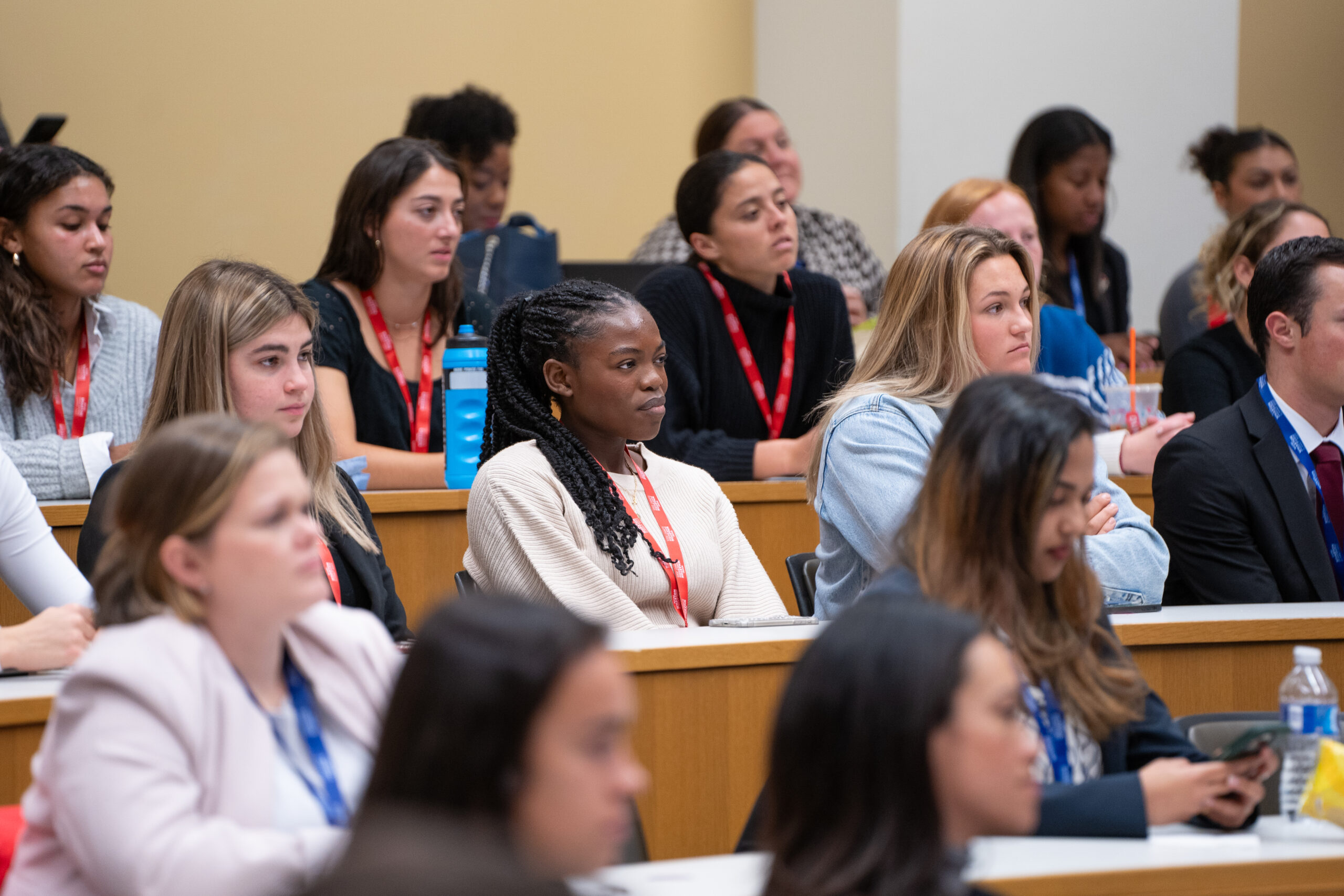
The Wharton Sports Analytics and Business Initiative (WSABI) and Wharton Undergraduate Sports Business Club (WUSBC) were thrilled to host the fifth Wharton Sports Business Summit on campus at the University of Pennsylvania on November 3, 2023.
The Summit, which attracted more than 200 registrants, featured a wide range of alumni and sports industry leaders who shared insights and expertise over the course of 15 different sessions.
To start the day off, attendees heard from Zack Weiner, President & Co-Founder of the burgeoning sports media brand Overtime, which boasts more than 65 million followers across social media – nearly half of which comes from their world-famous TikTok account. Weiner, a 2014 graduate from the University of Pennsylvania, spoke at length with Sam Schwartz, WG’90, Executive Vice President & Chief Business Development Officer at Comcast NBC Universal, about their respective career journeys.
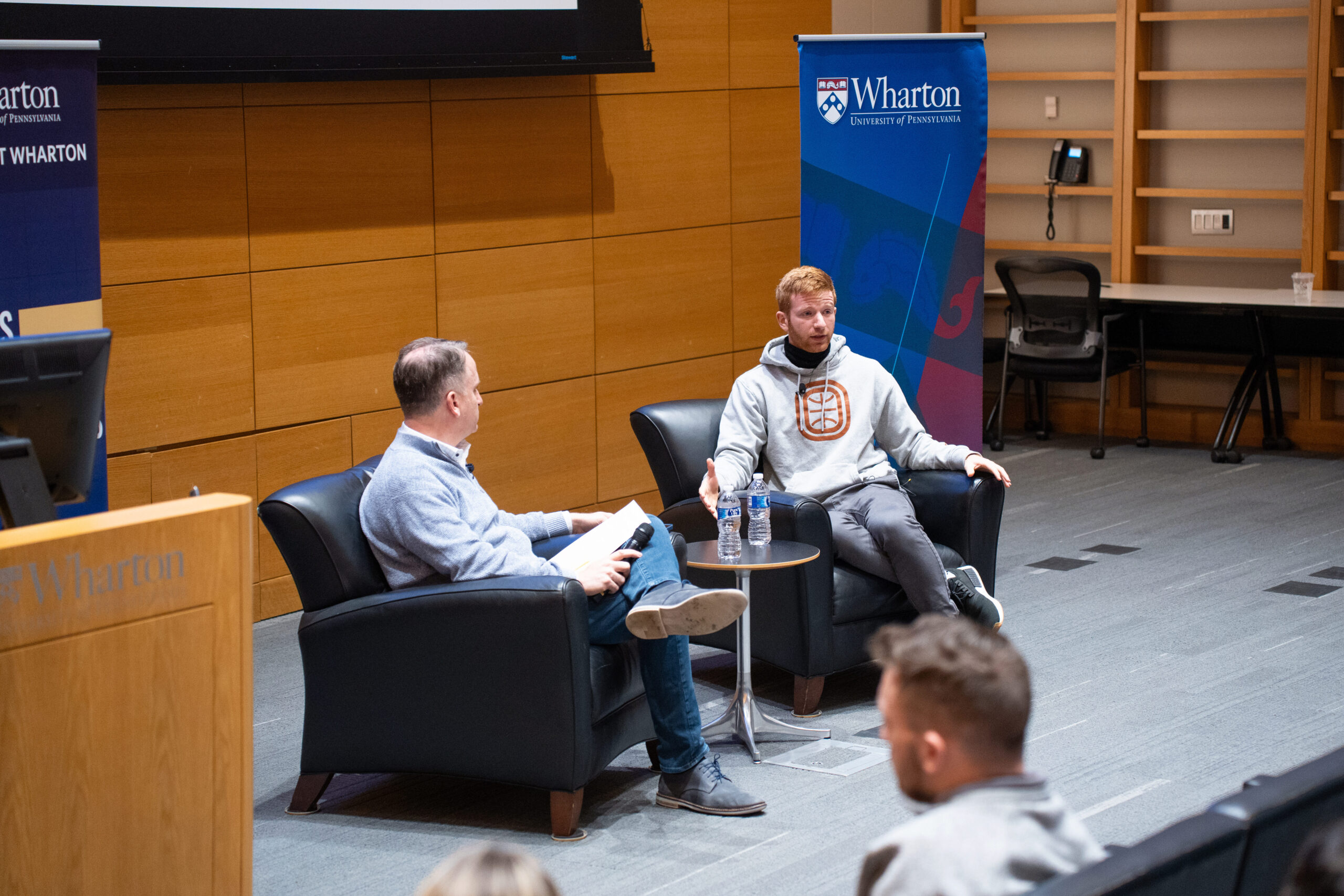
“Sports is unique in the way it’s able to occupy space in peoples’ minds and hearts, which ultimately creates a really interesting business opportunity.”
Zack Weiner, President & Co-Founder, Overtime
“Every company is looking for product-market fit,” said Weiner. “I would say that a majority of companies start with a product, and then iterate that product to find a market. Overtime is in the minority of companies that did the reverse. We identified our target demographic, which is Gen Z and Millennial sports fans. We said, ‘this is who we are trying to win the hearts and minds of through content, apparel, experiences, all of these things.’”
When asked by Schwartz how his company’s target demographic was being underserved by incumbent sports media entities, Weiner cited the hopefulness and positivity demonstrated by young internet users, which is directly at odds with the confrontational, drama-centered approach seen on incumbent sports debate shows like “First Take” and “Skip and Shannon: Undisputed.” “This next generation is actually very positive, and not just positive, but hopeful,” he said.
Weiner also cited emerging trends, such as young people not watching sports games live as frequently as their parents, and consuming most content through their phones rather than television, as factors influencing Overtime’s strategies.
“I do think that sports is unique in the way it’s able to occupy space in peoples’ minds and hearts, which ultimately creates a really interesting business opportunity…our job is to translate that passion and influence into monetization,” he said.
“The comprehensive education and research initiatives at Wharton equip students and professionals with the knowledge and skills they need to navigate the data-driven sports landscape effectively.”
Erika James, Dean of the Wharton School
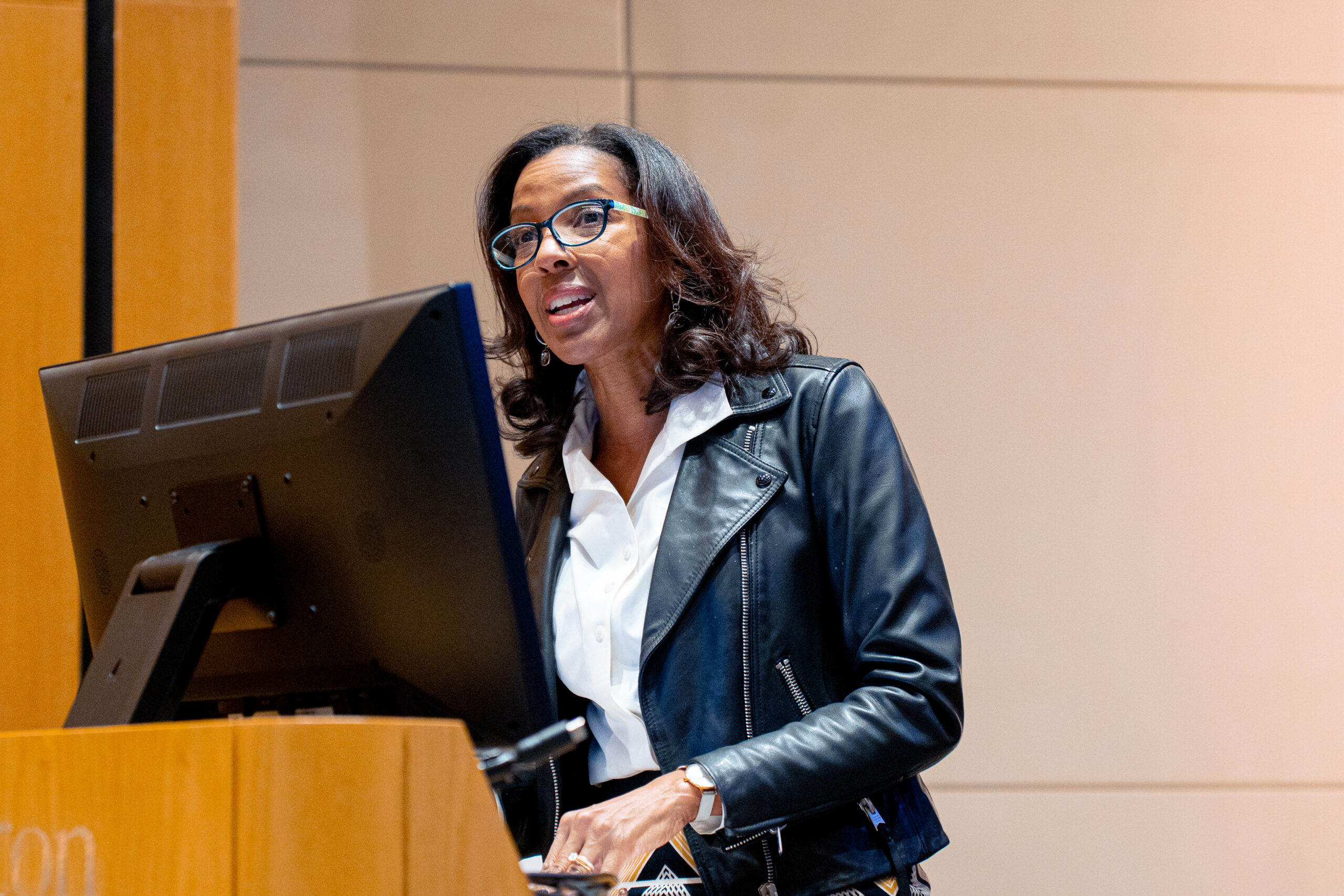
Following the opening keynote presentation, Erika James, Dean of the Wharton School, provided remarks on the value she identifies at the intersection of sports and business, and how Wharton is leading the way.
“The business of sport has never been more complex or more dynamic,” said Dean James. “One of the key drivers behind this transformation is the unprecedent role of data analytics in modern sports management and decision-making.”
With groups like WSABI and WUSBC, Dean James recognized the unique position Wharton holds for preparing the next generation of sports leaders both on and off the field.
“The comprehensive education and research initiatives at Wharton equip students and professionals with the knowledge and skills they need to navigate the data-driven sports landscape effectively. The cutting-edge research and innovative solutions emerging from Wharton contribute significantly to the development of sports analytics, influencing not only the way teams play, but how businesses operate within the industry.”
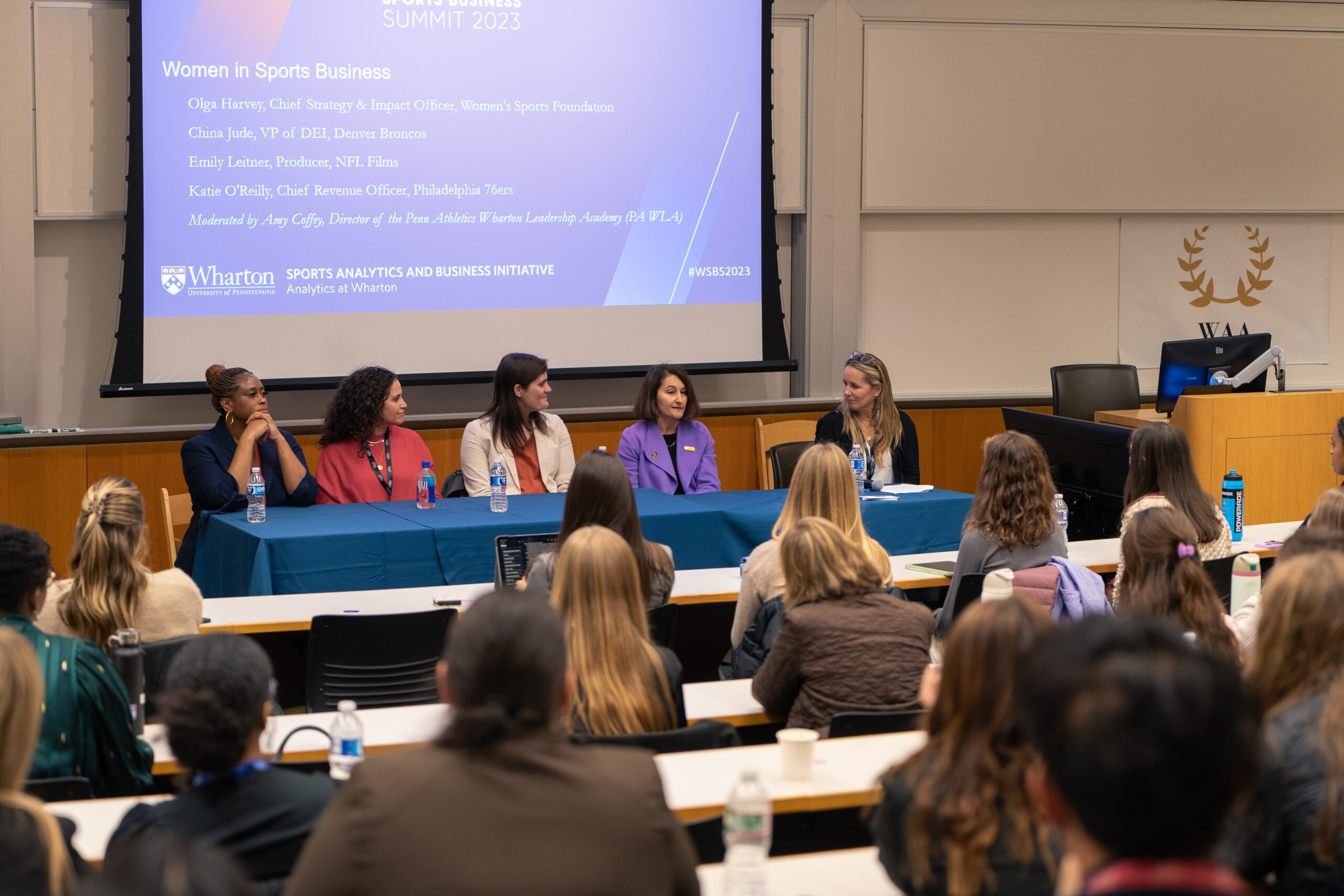
During lunch, a number of Penn alumni in the sports industry – such as Kori Carter, a current Wharton MBA student and Nike intern, and Genevieve Weikert, Fan Insights & Analytics with the Baltimore Ravens – chatted with attendees about their journeys and the experiences at Penn that shaped them.
One of the day’s many standout sessions was the Women in Sports Business panel, comprised of Olga Harvey, Chief Strategy & Impact Officer at the Women’s Sports Foundation, China Jude, Vice President of Diversity, Equity, and Inclusion at the Denver Broncos, Emily Leitner, Producer with NFL Films, and Katie O’Reilly, Chief Revenue Officer with the Philadelphia 76ers.
The panel, which was moderated by Amy Coffey, Director of the Penn Athletics Wharton Leadership Academy (PAWLA) filled every seat in classroom F85 at Hunstman Hall, with many attendees cramming into the back of the room to find what little standing room remained. The speakers shared their experience in helping to trailblaze a more equitable and gender-diverse sports landscape before offering optimism for the years to come. They stressed it would be up to individuals in the room and their peers to help shape the sports industry future they desired.
To close out the Summit, attendees heard from Val Ackerman, Commissioner of the NCAA’s Big East Conference. In conversation with Kenneth Shropshire, David W. Huack Professor Emeritus of Legal Studies and Business Ethics at Wharton, Ackerman shared her perspective on the landmark Name, Image, and Likeness (NIL) protocol, which now allows college athletes to profit financially from their public identities while retaining eligibility to compete as students in the NCAA.
“It was around four years ago,” Ackerman recalled. “Some states were beginning to introduce laws that, in effect, said ‘even if the NCAA prohibits student athletes from using their images to make money, we, the state of California, are going to allow it. We’re going to make it permissible in our state regardless of what the NCAA says.’”
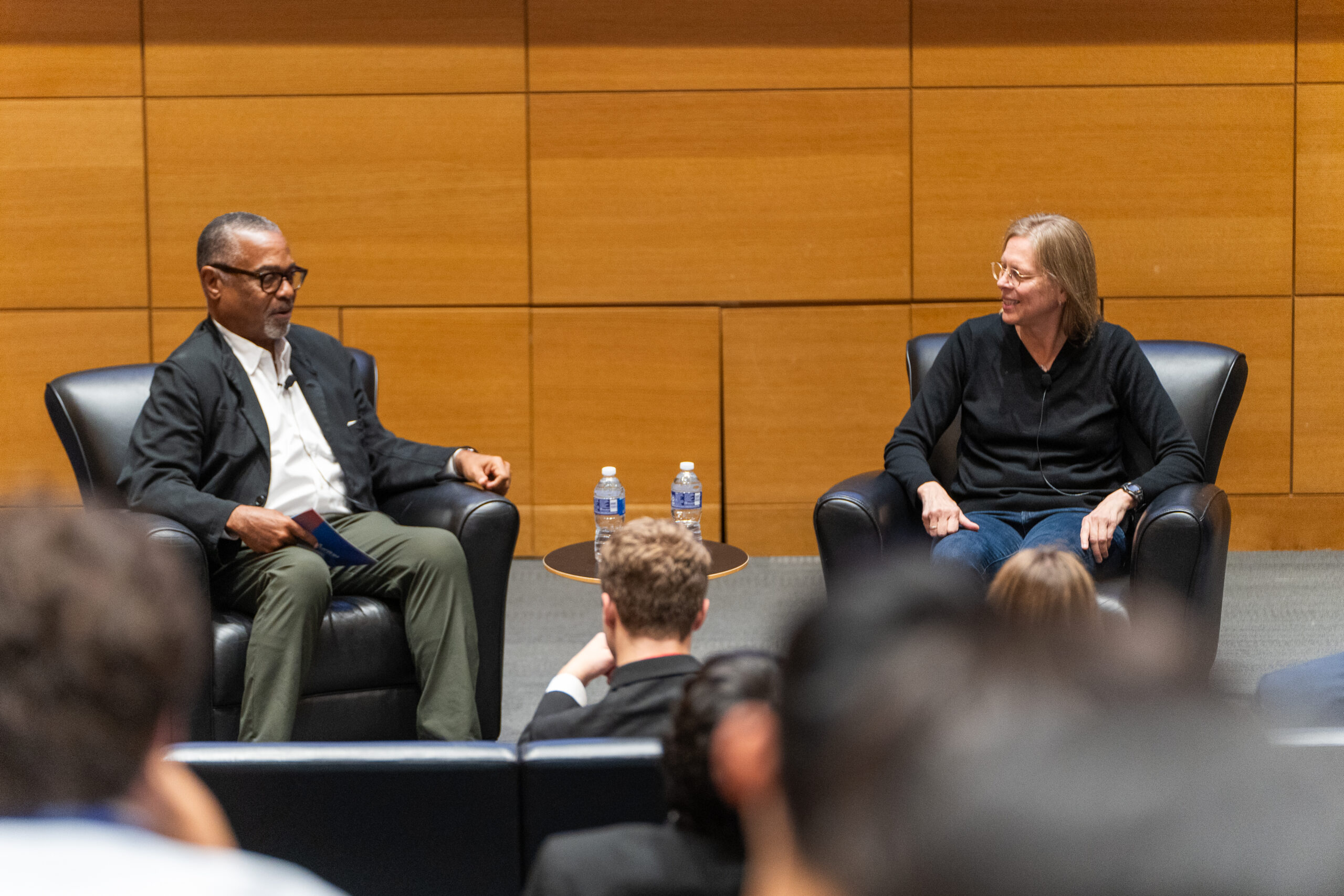
Ackerman explained that although California passed this measure, the state intentionally gave it a delayed effective date in order to give the NCAA time to make their own adjustments that would prevent governments from ever needing to weigh in. In response, the NCAA created a 25-person working group – atop of which Ackerman served as a chair – to help navigate the quickly changing waters surrounding the rights of student athletes.
“We quickly agreed student athletes should have the ability to do this,” said Ackerman, “in part because times had really changed. That said, we had concerns about how that would work in the college space. How could we keep these NIL arrangements from turning into, essentially, bribes in order to attend a particular school?”
As it stands now, there is a “patchwork” of individual state laws, with the NCAA offering different advice to students on how to handle and approach the topic of NIL, depending on where they go to school.
“It’s frankly become confusing for all concerned because we don’t have a single national standard,” Ackerman said. “That’s one of the reasons that the NCAA is trying to get Congress to intervene and come up with some uniform national [standard].”
Ackerman, the former President of the Women’s National Basketball Association, also offered what she saw as the best path forward for growing women’s basketball. “It’s going to be fans,” she said. “Fans who support the WNBA or the National Women’s Soccer League (NWSL), or whatever the next women’s team sports league is, in ways that can be monetized.” Ackerman cited the NBA’s rise in popularity to demonstrate the domino effect that makes it so valuable for fans to attend games. “Tickets are getting sold, they were able to charge higher prices, sponsors were getting interested because the buildings were full. People were watching on television, which drives up advertising rates, which drives up rights fees – and that money goes back to the players.”
To see Ackerman’s talk in full, as well as Zack Weiner’s, click here.


